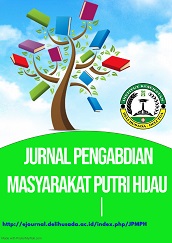PENINGKATAN KUALITAS HIDUP MENOPAUSE DENGAN EDUKASI PENERAPAN KOMPLEMENTER HERBAL DI DUSUN I SEKIP DESA CANDIREJO KECAMATAN BIRU-BIRU KABUPATEN DELI SERDANG TAHUN 2025
Abstract
Menopause is a natural phase experienced by women, generally at the age of 45–55 years, which is marked by a decrease in the hormone estrogen. Menopausal symptoms such as hot flashes, sleep disturbances, and mood swings often reduce quality of life. The use of hormone therapy (HRT) has the risk of side effects, so herbal complementary therapy is a safer and more culturally appropriate alternative. However, in rural areas such as Dusun I Sekip, Candirejo Village, community literacy regarding the use of herbs is still low. This activity aims to improve the quality of life of menopausal women through education about natural and safe herbal plant-based complementary therapies. The activity was carried out in the form of counseling and interactive discussions on May 8, 2025 at the Candirejo Village Hall. The methods used included lectures, discussions, and demonstrations with leaflet media. There were 33 participants present. The eval_uation was carried out through active participation and a question and answer session. Participants showed high enthusiasm, as evidenced by their active questions and discussions. There was an increase in understanding about menopause and how to manage its symptoms using local herbs such as temulawak, turmeric, ginger, and betel leaves. Participants also gained skills in mixing simple herbal preparations. Education on the application of complementary herbs has been proven effective in increasing knowledge and awareness of menopausal women. This approach encourages the use of local resources and reduces dependence on chemical drugs, as well as strengthening the empowerment of women in rural areas. It is recommended that educational activities such as this be carried out sustainably and integrated with village health services. The community is expected to form herbal learning communities and increase collaboration with health workers to monitor and assist in the use of herbs safely and appropriately.
References
Alifah, U. N., Putri, N. R., & Nugraheni, A. (2023). Complementary Therapies To Improve The Quality of Life of Premenopause Women. Journal of Midwifery Science, 5(1), 8–16.
Astyandini, B., & Juliana, D. (2025). Rahasia Sehat dan Bahagia di Masa Menopause: Solusi Ilmiah dan Praktis.
Fitria, L., & Ramadhani, A. (2023). Edukasi menopause berbasis masyarakat: Model intervensi dalam peningkatan kualitas hidup perempuan. Jurnal Keperawatan dan Kesehatan Masyarakat, 10(3), 140–147.
Hidayati, R., & Santoso, H. (2021). Community empowerment in menopausal care through women health group education. Jurnal Kebidanan dan Kesehatan Tradisional, 4(2), 98–104.
Maulida, R., & Puspitasari, D. (2023). Efektivitas pendidikan kesehatan berbasis partisipatif dalam peningkatan pengetahuan lansia. Jurnal Promosi Kesehatan, 11(2), 77–85.
Rahayu, E., & Darmayanti, S. (2024). Analisis biaya pengobatan herbal rumahan pada perempuan usia lanjut di pedesaan. Jurnal Ekonomi Kesehatan Indonesia, 6(1), 22–30.
Sari, H., & Lestari, D. (2022). Kandungan fitokimia dan manfaat antiinflamasi tanaman obat tradisional Indonesia. Jurnal Fitofarmaka Indonesia, 9(1), 12–18.
Septina, Y., Nurasiah, A., & Oktapiani, T. (2023). Efektivitas pemberian puding Aloe Vera terhadap kadar gula darah pada wanita menopausea. Journal of Nursing Practice and Education, 3(2), 128–136.
Zuniawati, Z. (2023). Hubungan kepercayaan diri dengan gejala psikologis pada wanita menopause. Jurnal Kebidanan dan Kesehatan (JKJ), 14(1), 23–31.












